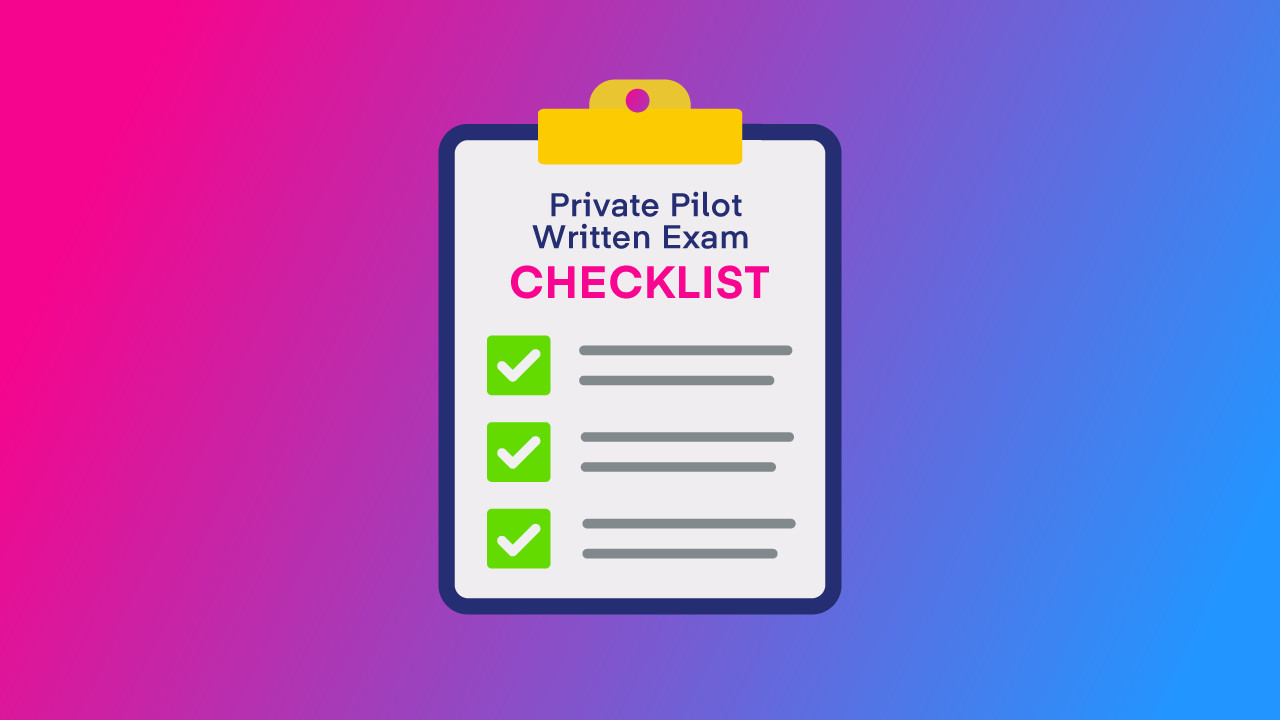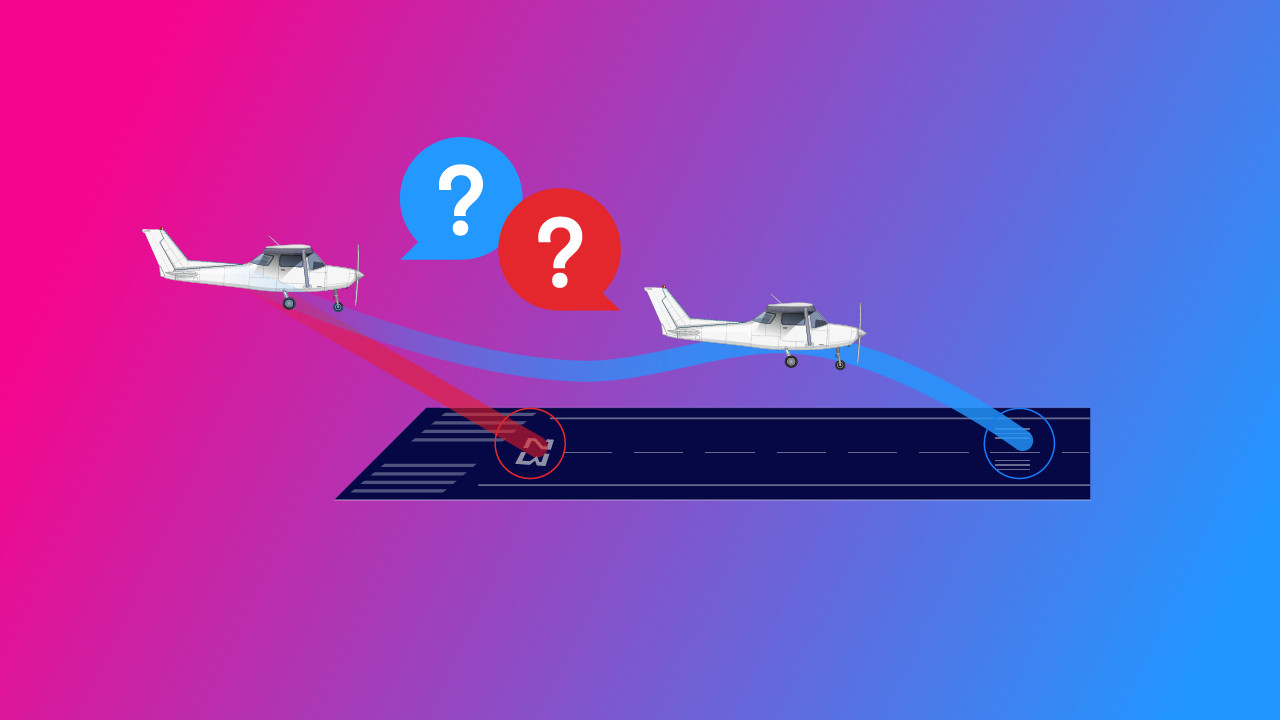-
Key Takeaways
-
Decode The PAR Knowledge Test
- Core Facts
- Why Timing Matters
-
Are You Eligible?
- Regulatory Requirements (14 CFR 61.35/61.96/61.103)
- Accepted Identification & Endorsement Matrix
- Medical & Student Pilot Certificate Basics
-
Register Like A Pro
- Create Your FTN & PSI Account
- Picking A Test Center & Date
- FAA Knowledge Exam Costs
-
Build A Winning Private Pilot Study Plan
- Understand—Don’t Memorize
- Choose Your Ground School Tools
- Harness FAA Free Resources
- Daily Study Workflow (30-Day Sprint)
- Use ACS & Test Supplement During Prep
-
Private Pilot Practice Exam Strategy
- Simulate The PSI Interface
- Scoring Benchmarks
- Error-Log System
-
Tools Of The Trade
- Master The Manual & Electronic E-6B
- Plotter & Paper Tricks
- What You Can and Cannot Bring
- Familiarize Yourself With Testing Supplement Figures
-
Night-Before & Morning-Of Checklist
- The 24-Hour Countdown
- Morning Routine
- Mental Warm-Up
-
Private Pilot Written Exam Tactics
- Read The Question Last
- Flag & Return
- Time Management
- Safe-Choice Philosophy
-
Post Private Pilot Test Actions
- Interpreting Your AKTR
- Filing & Sharing Results
- If You Didn’t Pass Your Private Pilot Written Exam
-
Written Exam Common Mistakes & How To Avoid Them
- Forgetting Your FTN or Using Incorrect ID
- Relying on Leaked Question Banks
- Neglecting Risk Management & ADM Scenarios
-
Curated Resources & Next Steps
- Must-Have Reference Links
- Planning For The Checkride
-
Conclusion
They call it the “Speed-Bump Effect,” that frustrating point in your flight training where everything stalls out right after your first solo.
FAA data shows that this lull can last up to 42 days just for you to gear up for the knowledge test. That’s a month and a half of lost momentum, and it adds up by the day.
Here’s the good news: we’ll give you exactly what you need to dodge that stall. You’ll even get a printable, CFI-approved checklist and a 30-day study blueprint—everything designed to keep your training flying smoothly.
Key Takeaways
- The FAA PAR test is a timed, 60-question exam about private pilot theory and knowledge.
- The ACS defines the standards and subjects that the knowledge test is built to evaluate.
- Build an effective study plan, use FAA materials, and log mistakes to refine weak areas.
- Be strategic as you answer the test, and review missed topics with your CFI afterward.
Decode The PAR Knowledge Test
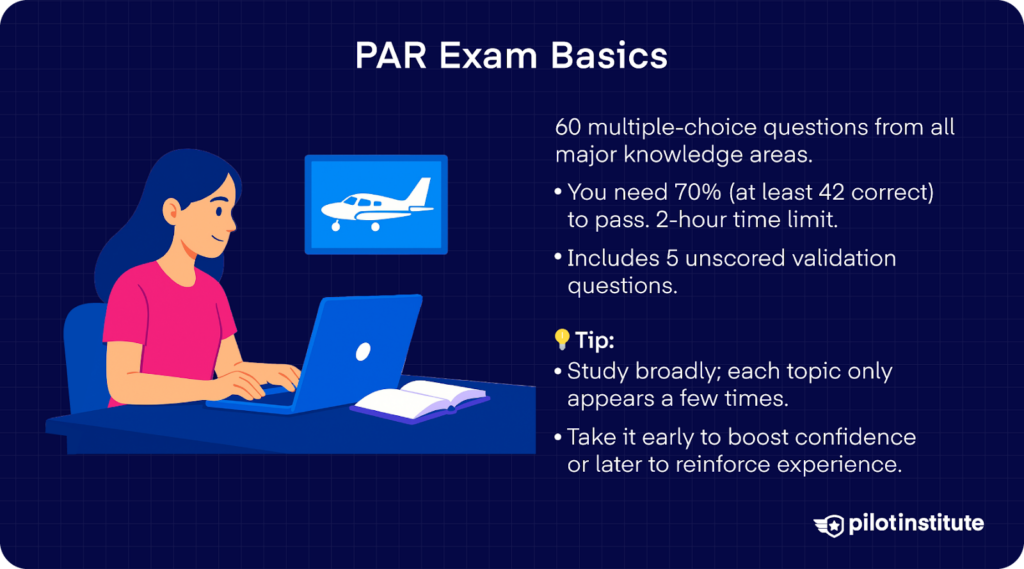
Item number one on your checklist is to find out what kinds of questions will appear on the knowledge test.
Core Facts
When you sit for the Private Pilot Airplane (PAR) exam, you’ll face 60 scored multiple-choice questions. But while this number seems like a lot, remember that the exam will be spread across all the subject areas you studied in school.
FAA Private Pilot Written Test Prep Blueprint
While the FAA does not publish an exact question count for each topic, the test questions are pulled from the required knowledge areas. The following is an estimated distribution to guide your studies.
| Knowledge Areas | Number of Questions |
| Regulations | 3 – 9 |
| Accident Reporting | 3 – 6 |
| Performance Charts | 3 – 6 |
| Radio Communications | 3 – 6 |
| Weather | 3 – 6 |
| Safe and Efficient Operations | 3 – 9 |
| Density Altitude Performance | 3 – 6 |
| Weight and Balance | 3 – 6 |
| Aerodynamics, Powerplants, and Aircraft Systems | 3 – 6 |
| Stalls and Spins | 3 – 6 |
| Aeronautical Decision-Making (ADM) | 3 – 6 |
| Preflight actions | 3 – 6 |
| Total | 60 |
This format mirrors the required knowledge areas listed in the Airman Certification Standards (ACS).
When you think about it, a topic like meteorology will only appear for a couple of questions. That’s why keeping your study coverage broad and well-rounded is important.
The FAA will also use five extra “validation” questions to test new content. Take note that validation questions are not counted in your final score.
How many questions do you need to get right? You’ll have 2 hours to complete the test, and you must score at least 70% to pass. This means that out of 60 questions, you’ll need to get at least 42 of them correct.
You’ll know your result immediately once you finish the knowledge test. Below your score, you’ll also find the knowledge areas you got wrong listed by their corresponding ACS codes.
Why Timing Matters
A large factor in acing your knowledge test comes down to timing. How does it make a difference?
Let’s think of it like this: if you take your exam before your first solo cross-country, you’d build confidence and integrate your knowledge with hands-on flying afterwards. Start early, and you’re more likely to stay energized and less likely to forget what you’ve learned.
But on the flipside, you’ll have more real-world flight experience in the exam room if you wait until after that first cross-country solo.
You’ll get to really reinforce those aviation concepts. However, your training might drag on, which could cause you to lose motivation.
Are You Eligible?
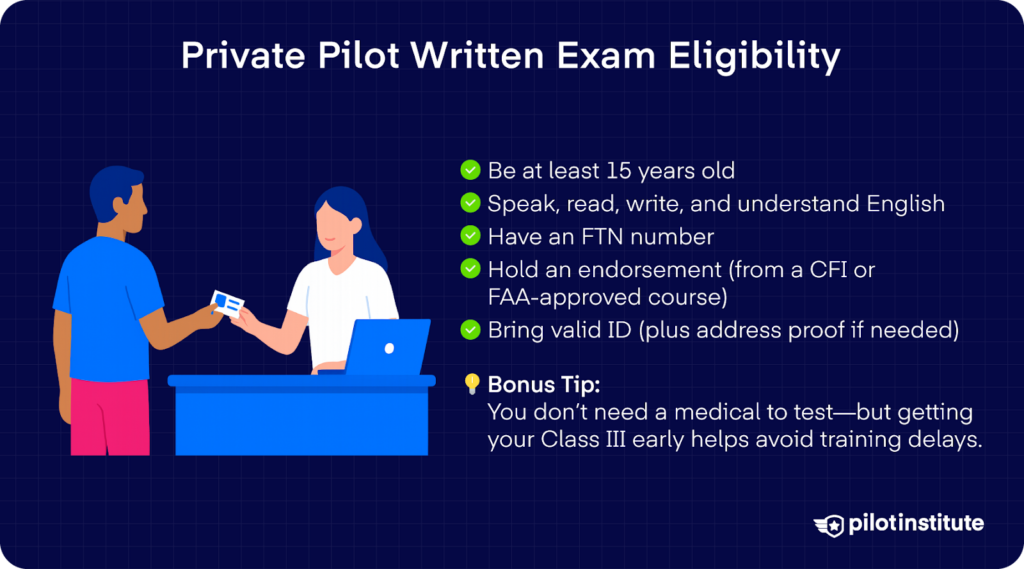
Before you dive into serious study, you need to make sure you’re qualified to take the FAA Private Pilot knowledge test. Are you eligible to take the exam?
Regulatory Requirements (14 CFR 61.35/61.96/61.103)
To avoid any surprises on test day, it won’t hurt to double-check. The FAA Airman Knowledge Testing Matrix spells out all the requirements to take your exam. Let’s untangle these requirements together.
To be eligible, you must:
- Be at least 15 years old on the day of the exam.
- Be able to speak, read, write, and understand English.
- Have your FAA Tracking Number (FTN).
- Hold a valid endorsement to take the test, which can come from:
- A written statement or logbook endorsement from your CFI under 14 CFR 61.35; or
- A graduate certificate if you completed a course at an FAA-approved school under 14 CFR 61.71.
- A written statement or logbook endorsement from your CFI under 14 CFR 61.35; or
Accepted Identification & Endorsement Matrix
At check-in, you’ll need to show a valid ID. The FAA accepts many different forms of ID, such as:
- U.S. Citizens/Residents: A government-issued photo ID (e.g., driver’s license) is all you need.
- Non-U.S. Citizens: Present your passport and either a driver’s permit or license issued by a U.S. state or territory, or an identification card issued by any government entity.
- Under 18 without acceptable ID: Your parent or guardian must accompany you, provide ID, and attest to your identity.
- If your address doesn’t match: Bring proof like a utility bill or your FAA Form 8710‑1.
- After a failed test: You’ll need a 14 CFR 61.49 endorsement and your AKTR before retesting.
Take a look at the testing matrix to find the complete list of acceptable forms of address verification.
Medical & Student Pilot Certificate Basics
Will you need an FAA Medical Certificate to take the knowledge test? Nope. But still, getting your Class III medical early can be a smart move.
It can uncover any issues that might delay your flight training. If you aim to fly for the airlines, you might even want to consider getting Class I right away to avoid any surprises down the line.
Plus, the medical form (FAA Form 8500‑9) includes your address, which saves you from scrambling for documentation on exam day.
Register Like A Pro
Create Your FTN & PSI Account
Are you scheduling your exam yourself? If you don’t already have an FAA Tracking Number, getting one should be your place to start.
FAA Tracking Number (FTN)
Your FTN will be your unique identifier in the FAA’s certification records. Take note that the same FTN will be used throughout your whole aviation career, so it’s essential that you have one.
First, visit the Integrated Airman Certification and Rating Application (IACRA) website. Click “Register” and fill in your information to sign up.
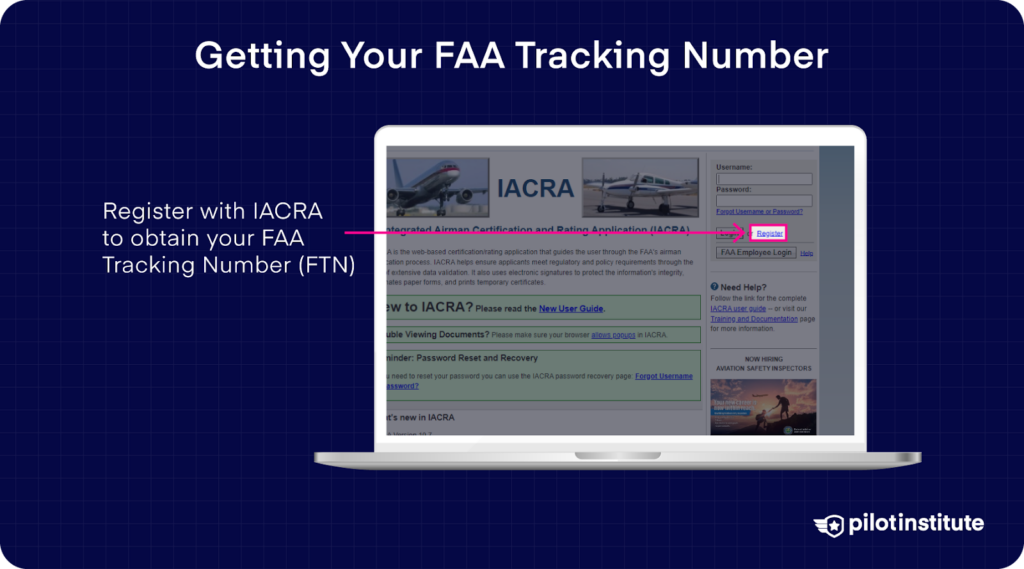
Once complete, you’ll immediately receive your FAA tracking number. You can screenshot this on the webpage, although your FTN will also be sent to your email.
PSI Account
You will need your FTN to create an account on the PSI website. Note that this is an entirely separate account from the one you created on the IACRA website, but PSI will require these records to match.
First, go to the PSI website and select “Create an Account.” You will need to provide some personal details to continue.
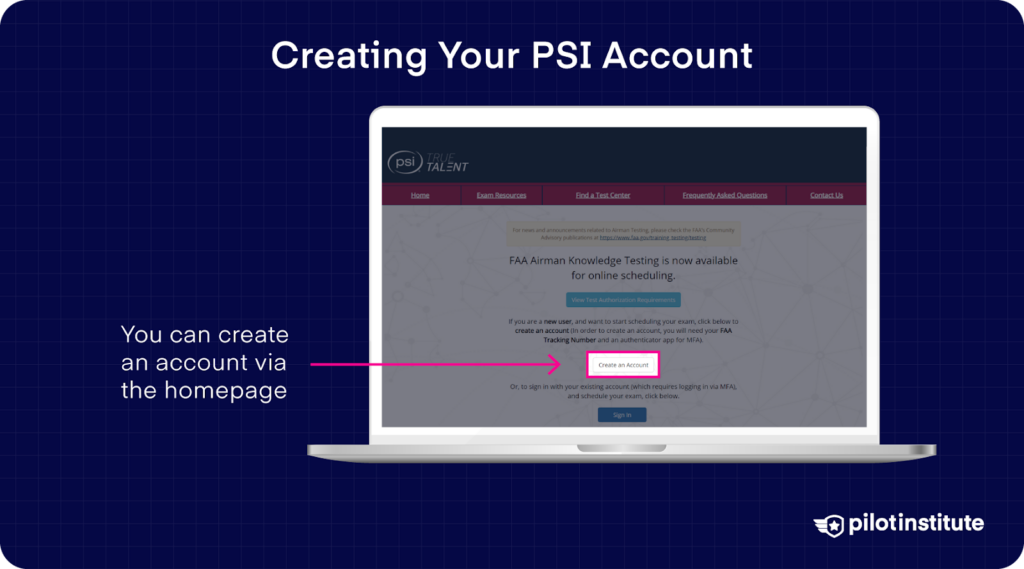
After creating your account, you should receive a message in your email inbox. Click the verification link, and it will bring you back to the PSI Registration page.
From here, you’ll need to fill out some more forms. Once everything’s complete, click “Register,” and you’ll have a PSI account!
Picking A Test Center & Date
Once registered, you’ll be brought to a page where you can select from a long list of exams by the FAA.
Once you’ve selected the right exam, you’ll need to fill out a few more details to proceed. You can browse for nearby testing centers on the main schedule selection page.
Go through each search result, and when you’ve found the testing center you want, select your preferred date and time slot.
FAA Knowledge Exam Costs
Lastly, you will have to pay for the testing fee. FAA knowledge tests on PSI generally cost between $175 and $200, depending on the exam.
However, keep in mind that pricing may vary slightly depending on the testing center and exam type.
You can pay for your exam with a credit card or a voucher. Fill out your billing information, and once the transaction is complete, your schedule is all set!
Build A Winning Private Pilot Study Plan
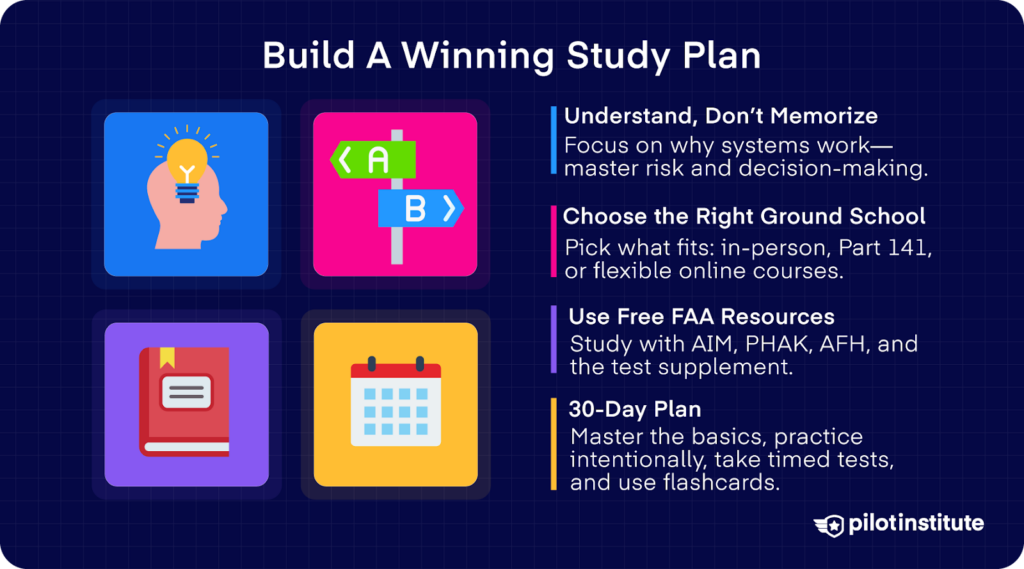
You’ve completed your requirements, your exam is scheduled, and it’s time to hit the books. But when reviewing for an exam, you can’t just wing it and hope for the best.
If you want to pass with confidence, you’ll need a solid strategy. How can you make the most of the time you have? Let’s dive in.
Understand—Don’t Memorize
At the heart of success is understanding. Check out the ACS and you’ll find that one of the elements you’ll be tested on is Risk Management.
What does risk management even mean? It’s your ability to identify, assess, and mitigate risk for every area of operation.
But when it comes to risk management, it’s not enough to just memorize checklists and hope they stick. True risk management operates at a correlation level.
You should master how every system in your aircraft works together, and be able to connect cause and effect. You’ll actually retain more when you grasp why things work.
Do you want to double down? Find a study buddy and take turns explaining tricky topics. The “teach-back” sessions will help you discover weak spots. In time, you’ll get a more solid understanding of even the most complicated concepts.
Choose Your Ground School Tools
Your ground school choice shapes how you learn. Classroom courses give you structure, and you learn at a standard pace. There’ll also be an instructor right there in front of you. However, these courses tend to be costly and inflexible.
If you study at a Part 141 school, you’ll train under FAA‑approved curricula. Your path to endorsement will be streamlined, but it may cost more upfront.
Online courses hit that sweet spot. They’re often cheaper, self-paced, and rich with videos. Sometimes, nothing beats a self-paced method if you’re disciplined.
Weigh the different factors like:
- Cost.
- Pacing.
- Learning style.
- Support access.
Evaluate your priorities, then pick what fits you best.
Harness FAA Free Resources
The FAA offers a wealth of study aids that align perfectly with the test. The best part? They’re absolutely free!
Be sure to review the Aeronautical Information Manual (AIM) for basic flight operations, and the Pilot’s Handbook of Aeronautical Knowledge (PHAK) for fundamental concepts.
Use the Airplane Flying Handbook to study flight procedures, and the Knowledge Testing Supplement for chart legends and figures.
For meteorology, consult the Aviation Weather Handbook. Refer to Advisory Circular 61‑65H for guidance on endorsements and testing procedures.
Daily Study Workflow (30-Day Sprint)
How should your study plan look? Let’s say you have 30 days to study before test day. You can break your prep into a focused 30-day sprint, which can look like this:
- Days 1–10: Focus on fundamentals. Study aircraft systems, basic aerodynamics, and regulations.
- Days 11–20: Start applying those ideas to multiple-choice questions. But instead of just answering, understand why each answer is right or wrong.
- Days 21–25: Run through full-length practice tests under timed conditions to simulate test day.
- Days 26–30: Drill your weak areas until they feel like second nature.
Want to get the best results? Include spaced repetition tools like an Anki deck of ACS codes. You can even quiz yourself using our very own Private Pilot Study Flashcards app!
Focus on definitions and flight procedures, and you’ll build your long-term recall. This will come in handy once you return to the cockpit.
Use ACS & Test Supplement During Prep
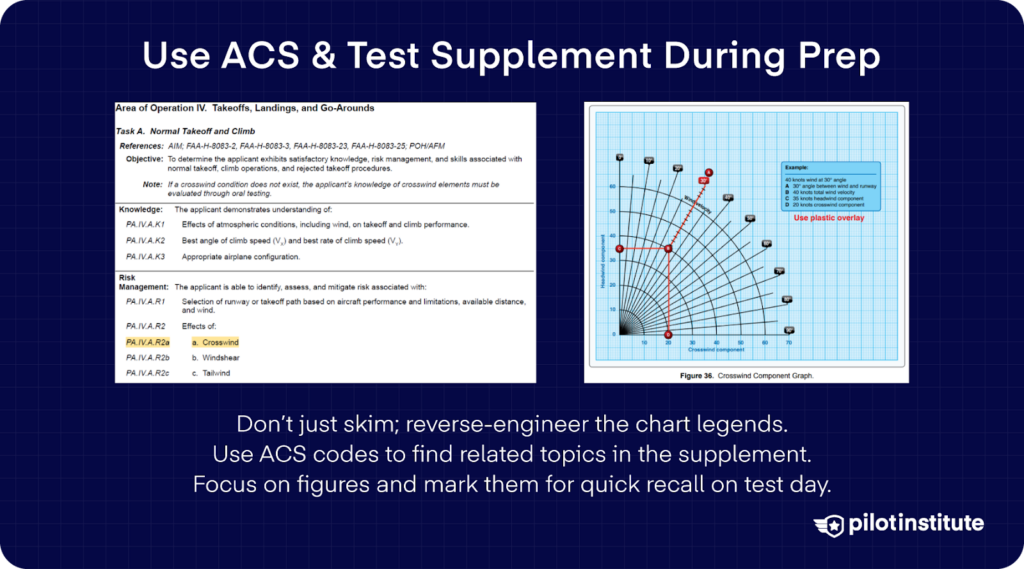
A smart pilot doesn’t just skim the chart legends; they reverse-engineer them. Sounds complicated? Here’s how you can do it:
When studying the ACS, look up each code. Study what it covers, then locate those topics in the FAA test supplement.
Check the performance charts in the test supplement figures 36–44 (power settings, takeoff/landing distances, crosswind components). This document is a treasure trove.
Mark these as you go and get familiar with them. On test day, you’ll recognize them instantly, so you’ll be answering with confidence.
Private Pilot Practice Exam Strategy
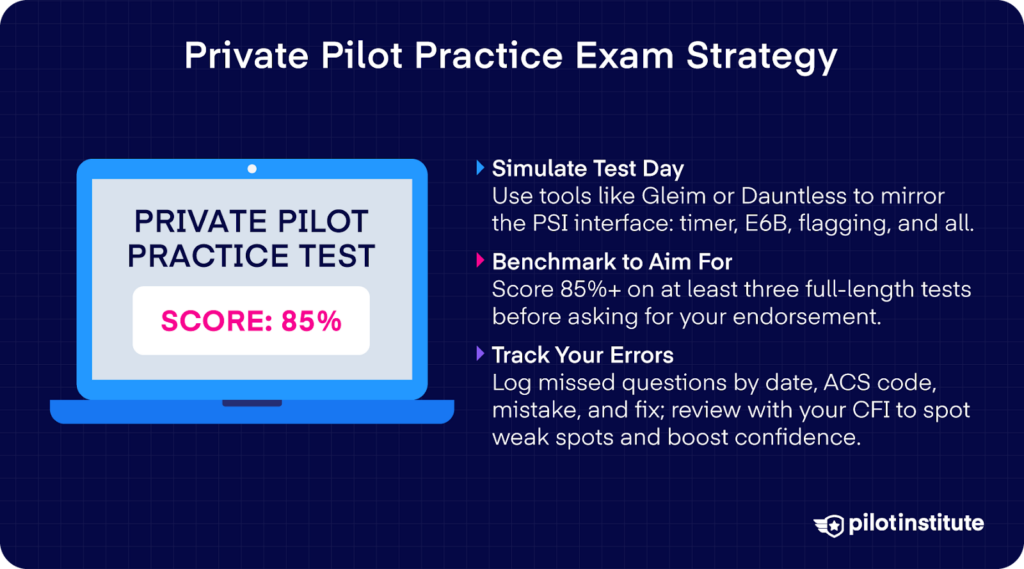
Another excellent study tool is taking practice exams. They help give you a “feel” for the real thing. Sitting for your knowledge test will be less daunting when the visual cues feel familiar.
Simulate The PSI Interface
To prepare for test-day success, practice in a setting that mirrors the official PSI system. That means using software that simulates the built-in timer, flagging feature, and on-screen E6B calculator.
Try using tools like Private Pilot Made Easy.
You can even throw down the gauntlet: try completing a full 60-question set in 90 minutes. That leaves you with a 30-minute buffer to review flagged questions and double-check your answers before time runs out.
Scoring Benchmarks
When you’re ready for real progress, here’s your benchmark: run at least three full-length practice exams. Set a minimum score for yourself of 85 % or higher on each run.
Once you’re able to do this consistently, that’s when you can ask your instructor for an endorsement.
Track your rolling average to spot any plateaus in your progress. For example, if your score stalls at 82–84 %, it’s probably a sign that you need to drill deeper.
Error-Log System
How can you easily track your progress? Here’s a sample: create columns for Date, Question ID, ACS Code, Mistake Type, and Fix Action.
| Date | ACS Code | Mistake Type | Fix Action |
| 26 July | PA.I.A.K1 | Knowledge – Certification requirements, currency, recordkeeping | Reviewed 14 CFR Part 61 sections; created flashcards summarizing pilot privilege and currency rules |
| 26 July | PA.I.B.K3 | Knowledge – Equipment requirements for day VFR flight (e.g., inoperative equipment) | Studied 14 CFR 91.205 & POH equipment list; practiced hypothetical scenarios of flying with inoperative equipment |
After every practice session, log every incorrect answer and jot down what went wrong and how you’ll correct it. Then, schedule time each week to review the log with your CFI.
Any weak areas will be easier to spot when you log them in a neat and organized list. And with effort and progress, you’ll also build your confidence as you see improvement in your understanding.
Tools Of The Trade
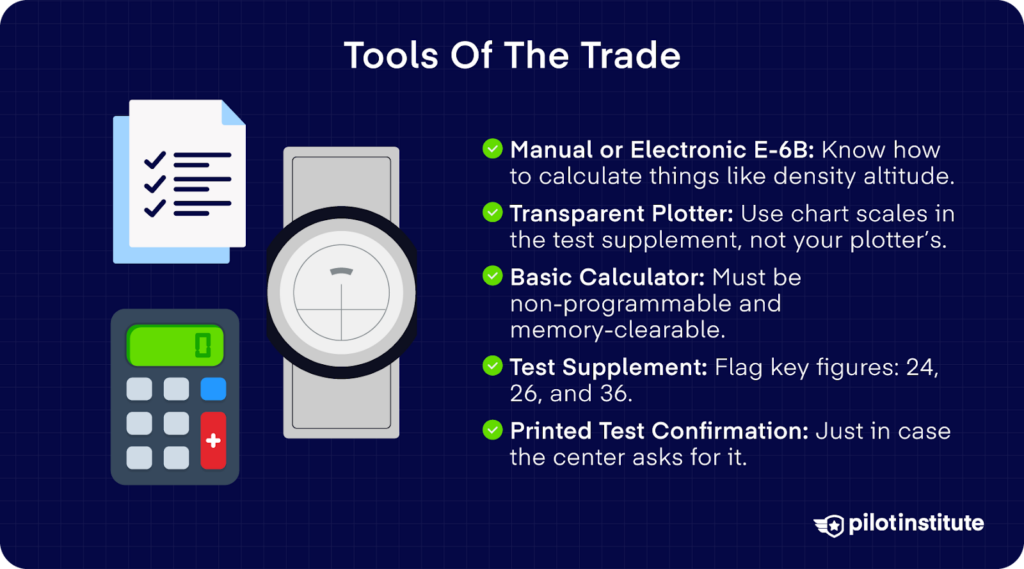
On your knowledge test, you’ll also need to know how to operate pilot tools for calculations like aircraft performance and weather conditions. How can you unlock the best results out of these tools? Let’s talk about it.
Master The Manual & Electronic E-6B
Your E‑6B flight computer is a powerhouse tool on test day. You’ll get an even bigger edge when you know how to use both versions.
For example, let’s work through this density altitude problem. Pull out your E-6B and let’s try it together:
Determine the density altitude at a pressure altitude of 5,000 ft and a temperature of 30 °C.
A. 6,000 ft
B. 9,000 ft
C. 8,000 ft
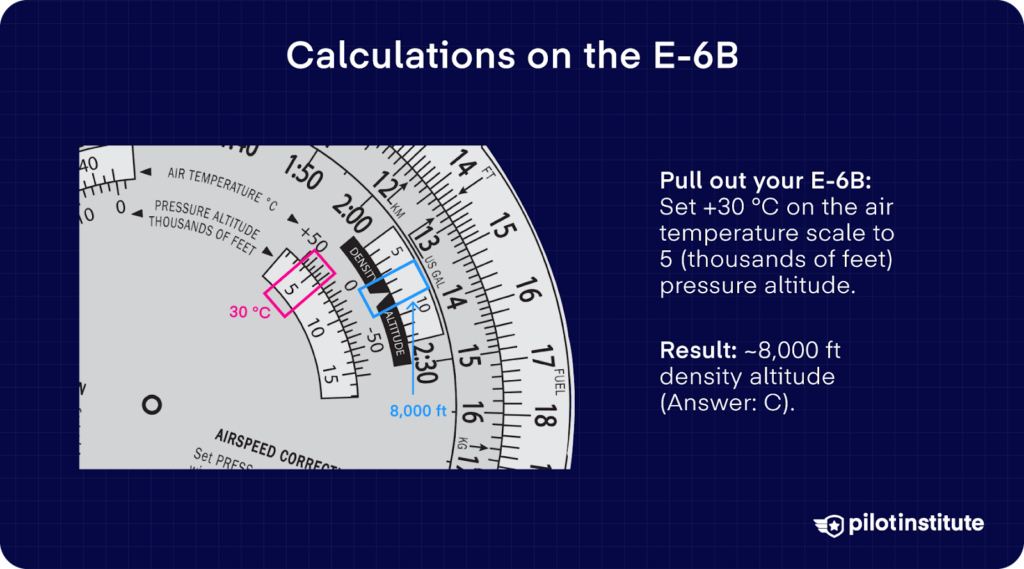
With your E‑6B flight computer, line up +30 °C in the air temperature scale with 5 (thousands of feet) in the pressure altitude window. If you set it correctly, you should find a density altitude of about 8,000 ft.
Note that the E-6B is an analog computer, so it can only be accurate to a certain extent. But when you look at the choices, you should be able to find one closest to your result, so it’s safest to pick C. 8,000 ft as your answer.
Plotter & Paper Tricks
When working with charts in the testing supplement, always use the scale provided directly on the figure itself to measure distances.
Do not use the scale on your personal plotter, as the figures in the supplement are not printed to a standard chart scale. This way, you’re gliding through distance problems without wasting time measuring mid‑test.
What You Can and Cannot Bring
Which items are allowed in the testing room, and which should you leave outside?
You can bring a transparent plotter, a manual or electronic E‑6B, and a calculator that only does basic math with memory that can be cleared. It’s also a good idea to bring a printed confirmation of your test appointment or payment receipt.
Generally, you’ll have to leave your electronic devices, such as your phone or tablet, books, notes, backpack, food, and drinks, outside the testing room. The testing center will usually provide scratch paper if you need it.
Keep in mind that each testing center has its own list of requirements and prohibited items, so this may be different for you. Be sure to check the reminders sent to your email address or reach out to the testing center before exam day.
Familiarize Yourself With Testing Supplement Figures
Before you sit down, flip through the test supplement and flag a few hot‑spot figures: Figure 26, Figure 24, and Figure 36.
Tag or tab those pages so they’re easily within reach. You’ll thank yourself when a time-consuming question pops up.
Night-Before & Morning-Of Checklist
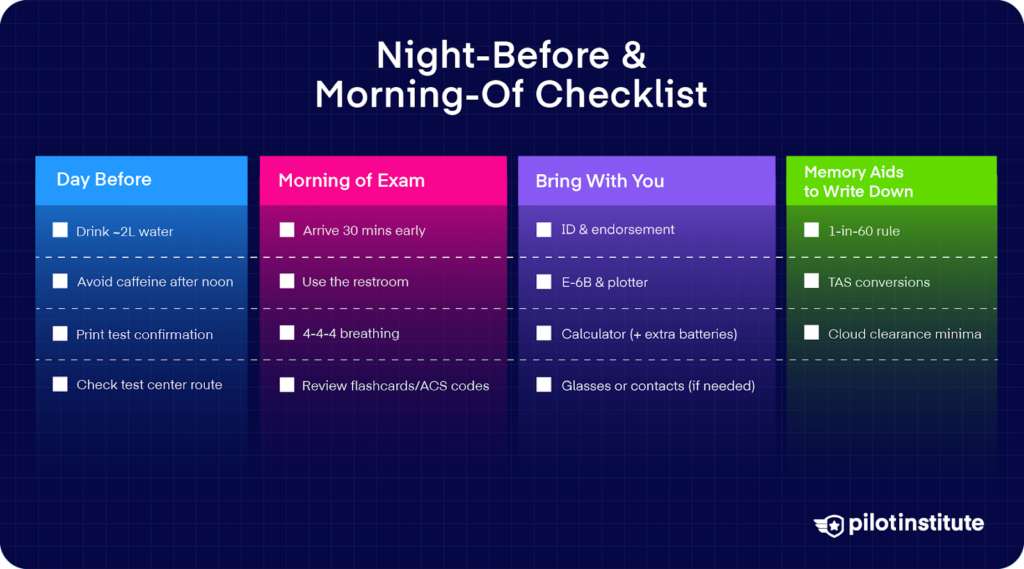
What you do the night before or the morning of your exam has a bigger impact on your performance than you think. Many pilots have worked diligently to master the topics in the exam, only to sabotage their efforts before the big day.
So, how can you give yourself the best shot at success?
The 24-Hour Countdown
The day before your test, treat it as “launch prep.” What does this mean? Dial in your hydration and drink around 2 liters of water. You’ll be able to avoid early fatigue or brain fog. When it matters most, you’ll be sure to stay sharp.
Ease up on caffeine after noon since it’s a diuretic and can mess with your focus. That evening, hit “print” on your PSI test confirmation and double‑check the route to the testing center.
Pack your essentials before bed. Don’t forget these must-haves:
- Your photo ID.
- Endorsement.
- Flight computer and plotter.
- A pen or pencil.
- Extra calculator batteries.
- Any glasses or contact lenses you’ll need.
Morning Routine
It’s important to set the tone for the rest of the day; a big part of this comes down to being calm and managing anxiety. Plan to arrive 30 minutes early since you’ll want a buffer for sign‑in and relaxation.
Once there, take a solid bathroom break, then try a simple 4‑4‑4 box breathing exercise. Inhale for four seconds, hold for four, exhale for four, and pause for another four. As this slows your heart rate, it creates a rhythm that promotes calmness.
Mental Warm-Up
While you’re waiting to be called into the testing room, flip through a few flashcards or mentally review ACS codes you’ve been drilling. That mental primer prepares your brain so you start the test firing on all cylinders.
After you’re seated and before the timer starts, write down your go‑to formulas and memory aids on scratch paper.
Keep note of things like Calibrated to True Airspeed conversions, the 1‑in‑60 rule, and essential cloud clearance minima.
Private Pilot Written Exam Tactics
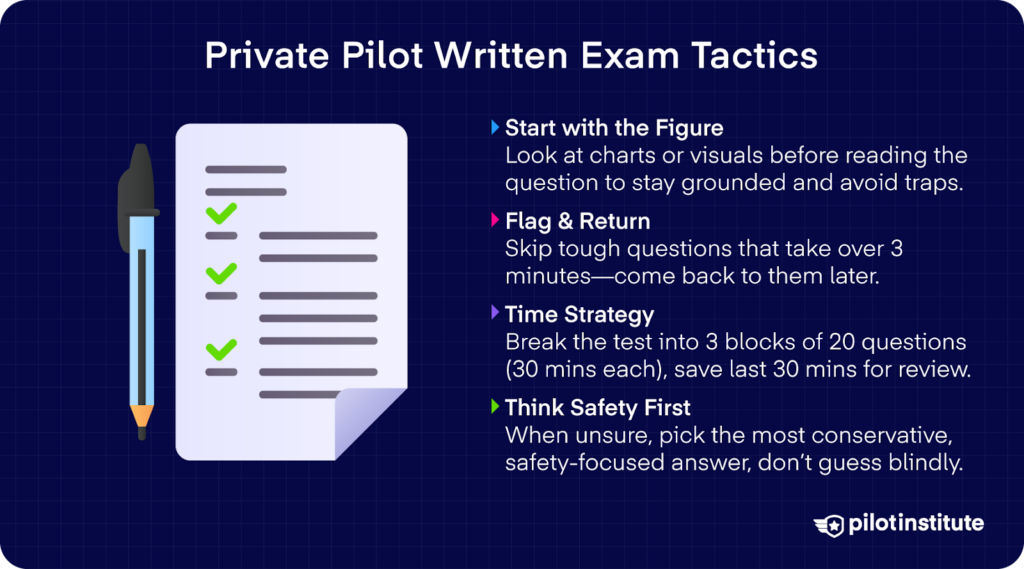
You’re in the exam room. The clock starts ticking, and the first question lights up on the screen. You’ve prepared for this moment. Now, it’s just you and the test.
What you do during the exam is as important as what you did leading up to it. Smart techniques can help you avoid the classic traps that derail even the most prepared pilots.
Read The Question Last
You’ll perform best when you look at the figure before reading the question or answers. Some questions might also include charts or performance tables. Stare at the figure or the options first to find your footing before tackling the question.
Starting with the visual component helps you immediately grasp the scenario. You’ll also be less likely to be misled by “bright” but incorrect choices. Watch out, because they are designed to distract you.
Flag & Return
If a question looks like it’s going to take more than three minutes to calculate, skip it and flag it. Answer the questions you know first to build some momentum. Once you’ve gotten most of the questions down, come back to flagged items during the review segment.
Time Management
You want to drive the test, not let it drive you. A solid time‑management strategy is to divide the 60 questions into three 30-minute blocks of 20 questions each. Leave a bonus 30 minutes to tackle flagged questions and review your answers.
| Question Block | Target Time |
| 1–20 | 30 min |
| 21–40 | 30 min |
| 41–60 | 30 min |
| Flagged questions + Final reviews | 30 min |
Check with your specific testing center regarding their policy on wristwatches. Many electronic devices, including smartwatches, are prohibited. If a simple analog watch is permitted, it can be a helpful tool for pacing your progress.
Safe-Choice Philosophy
Despite your best efforts, some questions could leave you genuinely stumped. What should you do if you can’t arrive at an answer?
The second-best move is to go for the most conservative, safety‑oriented option. Err on the side of caution, as they say. You could be safer with lower speed, more vertical separation, or extra cloud clearance.
That said, by no means should you confuse this with carefree guessing. You still have to apply a risk-based mindset fundamental to aeronautical decision-making.
Post Private Pilot Test Actions
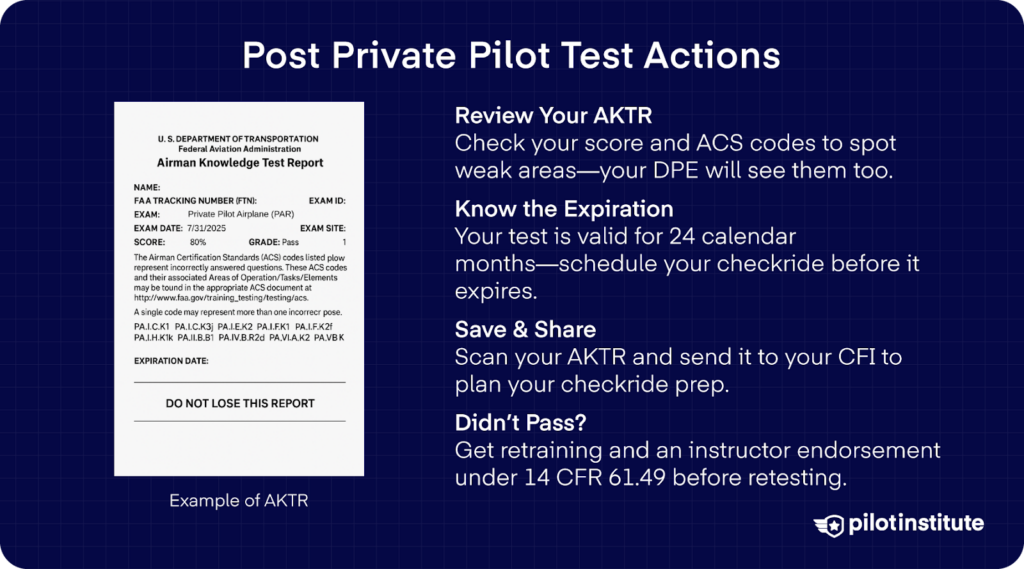
You’ve reached the final question. With the click of a button, the private pilot written exam is behind you.
What you do next can set the tone for the rest of your training. Your knowledge test wasn’t the finish line, but just a checkpoint.
Interpreting Your AKTR
Your Airman Knowledge Test Report tells you more than a pass/fail. At the top, you’ll see your name, FAA Tracking Number, exam code, date, and raw score.
Below that, you’ll find ACS deficiency codes, where each one corresponds to any topics you missed. This is a great place to find any weak spots. Don’t ignore this list, it could even bear weight in your practical test!
Next, you’ll notice an expiration date on your knowledge test report. Your checkride for both the oral and practical portions must be completed on or before that date.
What if you miss the deadline? Then you’ll have to retake the knowledge test from scratch. For most exams, this expiration falls 24 calendar months from the end of the month you took the test, so mark it on your calendar as soon as you receive it.
Now, if you don’t pass, you’re going to need the portion below the dashed line. This is where your instructor will sign off their endorsement for your retest.
Filing & Sharing Results
Don’t let your AKTR collect dust. Scan it to the cloud and email a copy to your CFI. This helps your instructor see your deficiencies. It could even save you precious time on your checkride prep.
Your examiner will review the AKTR during the oral portion. A clean, digital copy only makes your checkride run more smoothly.
If You Didn’t Pass Your Private Pilot Written Exam
It happens to the best, but it’s not the end of the journey. Under 14 CFR 61.49, you can only retake your knowledge test after meeting two requirements.
First, you must receive additional training from an authorized instructor who determines that you’re now proficient to pass. Second, that same instructor must provide you with an endorsement confirming the additional training.
Use that time wisely. Craft a remedial study plan based on your error log. Focus on weak ACS code areas and take a private pilot write exam practice test. Once you’re feeling (cautiously) confident again, ask your instructor to review your progress before signing you off.
Written Exam Common Mistakes & How To Avoid Them
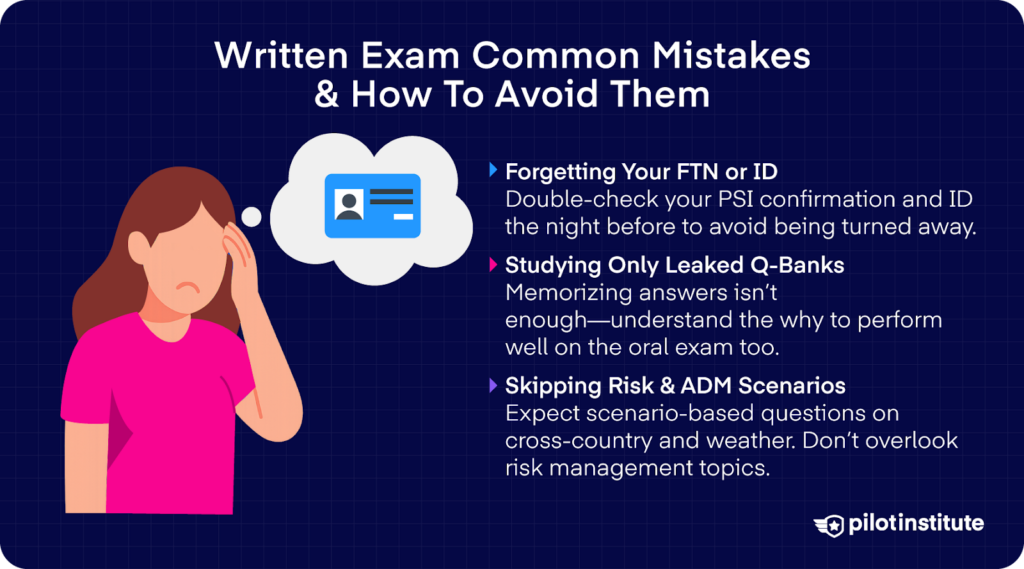
You don’t want to be that examinee who rummages through their bag and shows up to the testing center unprepared. Some mistakes happen all too often in the exam room, so watch out for them.
Forgetting Your FTN or Using Incorrect ID
One of the simplest—but most frustrating—errors students make is forgetting their FTN or bringing the wrong ID to the test center. If you come without them, you could be turned away.
To avoid any headaches, double-check everything the night before. Check your confirmation email, ensure you’ve printed your PSI confirmation with your FTN, and have your ID ready.
Relying on Leaked Question Banks
It might be tempting to focus only on leaked Q-bank content, but this move often backfires, especially on the oral portion of your checkride.
You’ll succeed only if you truly understand the underlying principles, and you’re not just memorizing answers. Leaked banks might help you pass the written exam, but if you can’t explain why an answer is correct during your oral exam, it becomes too obvious.
Instead, your aim should be to build real mastery and decision-making skills.
Neglecting Risk Management & ADM Scenarios
The FAA now heavily emphasizes risk management and aeronautical decision-making (ADM) in exam questions.
If you ignore these areas, you’re likely to miss scenario-based questions, especially those about cross-country or weather-related judgments.
Curated Resources & Next Steps
Must-Have Reference Links
Let’s bring it all together: your guided finish line and the next chapter in your pilot journey.
Bookmark these official FAA sources now, since these will be the backbone of your exam prep:
- FAA Airman Knowledge Testing Matrix
- Airman Certification Standards
- Knowledge Testing Supplement
- IACRA website
- PSI Scheduling Portal
Planning For The Checkride
Your written exam isn’t the finish line but just the launchpad for your checkride. Where do you go from here?
Start weaving ACS subject areas into every dual flight lesson right after you pass the written. For example, if your written deficiency codes include “PA.I.A.K1”, bring those into your ground briefings and discussions.
Get started on those oral exam flashcards as soon as you finish the knowledge test. Make decks built around knowledge, risk management, and skill.
Run them with your instructor or study buddy weekly before your practical flight lessons. You should be working towards a mindset geared for your checkride and beyond.
Conclusion
As we’ve seen, the FAA Private Pilot Knowledge Test isn’t a test of memorizing trivia. It demands that you build a strong foundation for real-world flying.
The formula is simple. Eligibility prep + ACS-based study + disciplined practice = high score.
If you’re ready, now’s the time to act. Download the printable checklist, commit to a 30-day study sprint, and schedule your PAR exam this week. After you pass, pay it forward! Share your experience in a student pilot forum or aviation group.
And remember: while passing proves you’ve got the knowledge, true mastery shows when the prop stops. Stay curious. Keep asking questions. And never stop learning, because aviation rewards the sharp, the humble, and the ready.
